Entrepreneurship: Ventures, Impact on Economy, and Skills Analysis
VerifiedAdded on 2020/07/23
|15
|4726
|72
Report
AI Summary
This report delves into the multifaceted world of entrepreneurship, commencing with an introduction that defines the concept and its significance in driving economic growth. The assignment then examines various entrepreneurial ventures, categorizing them based on their objectives and scope, including small-scale startups, scalable startups, large company entrepreneurship, social entrepreneurship, and female entrepreneurship. It analyzes the similarities and differences among these ventures, highlighting the role of creativity and innovation. The report further explores the impact of small businesses on the economy, emphasizing their characteristics, contributions to employment, and adaptability. The effects of Brexit on the social economy are also examined, considering the role of small businesses in the context of societal and economic changes. Finally, the report discusses the characteristics, traits, and skills of successful entrepreneurs, along with the influence of background and past experiences on fostering or hindering entrepreneurial endeavors, providing a comprehensive overview of the key aspects of entrepreneurship and its influence on the economy and society.

Entrepreneurship
Paraphrase This Document
Need a fresh take? Get an instant paraphrase of this document with our AI Paraphraser
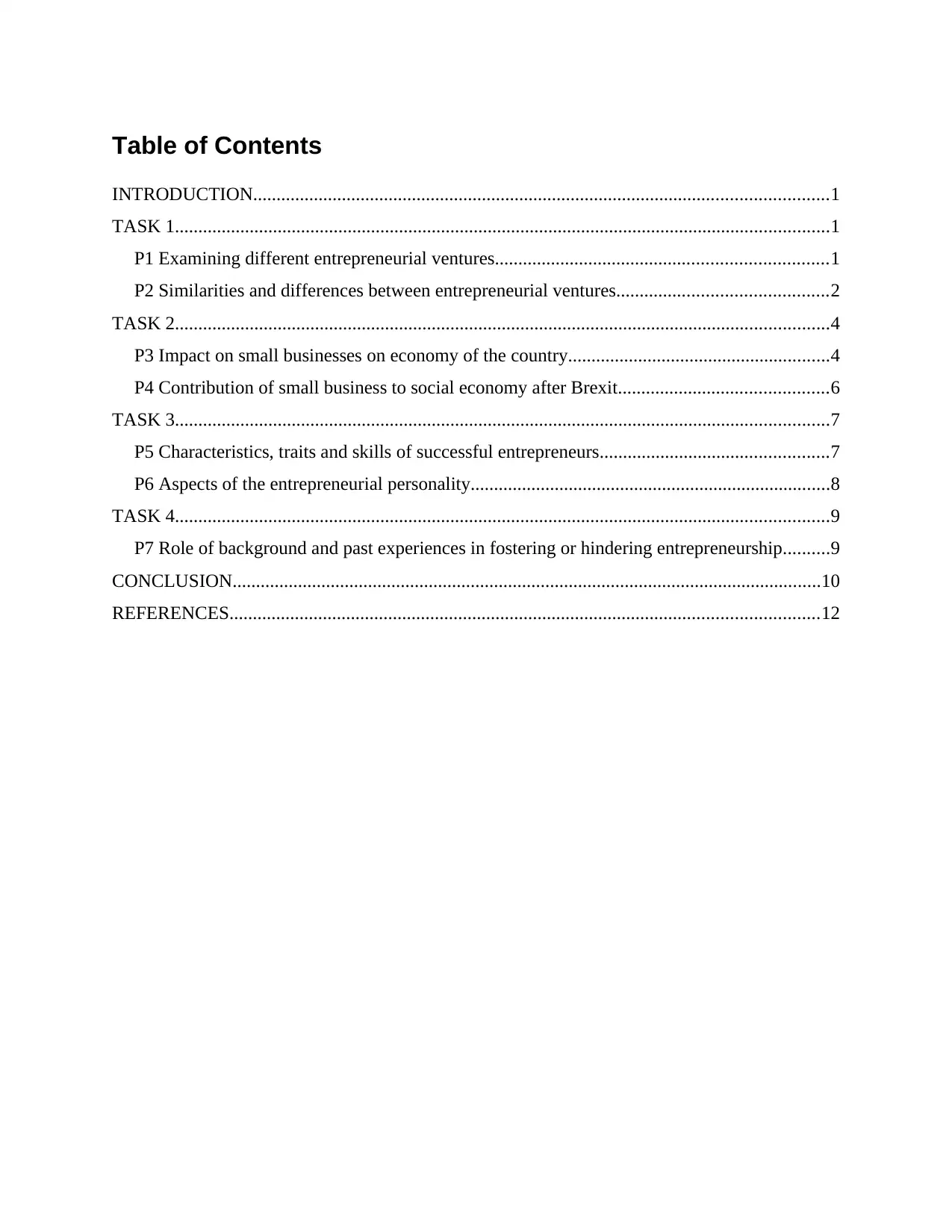
Table of Contents
INTRODUCTION...........................................................................................................................1
TASK 1............................................................................................................................................1
P1 Examining different entrepreneurial ventures.......................................................................1
P2 Similarities and differences between entrepreneurial ventures.............................................2
TASK 2............................................................................................................................................4
P3 Impact on small businesses on economy of the country........................................................4
P4 Contribution of small business to social economy after Brexit.............................................6
TASK 3............................................................................................................................................7
P5 Characteristics, traits and skills of successful entrepreneurs.................................................7
P6 Aspects of the entrepreneurial personality.............................................................................8
TASK 4............................................................................................................................................9
P7 Role of background and past experiences in fostering or hindering entrepreneurship..........9
CONCLUSION..............................................................................................................................10
REFERENCES..............................................................................................................................12
INTRODUCTION...........................................................................................................................1
TASK 1............................................................................................................................................1
P1 Examining different entrepreneurial ventures.......................................................................1
P2 Similarities and differences between entrepreneurial ventures.............................................2
TASK 2............................................................................................................................................4
P3 Impact on small businesses on economy of the country........................................................4
P4 Contribution of small business to social economy after Brexit.............................................6
TASK 3............................................................................................................................................7
P5 Characteristics, traits and skills of successful entrepreneurs.................................................7
P6 Aspects of the entrepreneurial personality.............................................................................8
TASK 4............................................................................................................................................9
P7 Role of background and past experiences in fostering or hindering entrepreneurship..........9
CONCLUSION..............................................................................................................................10
REFERENCES..............................................................................................................................12
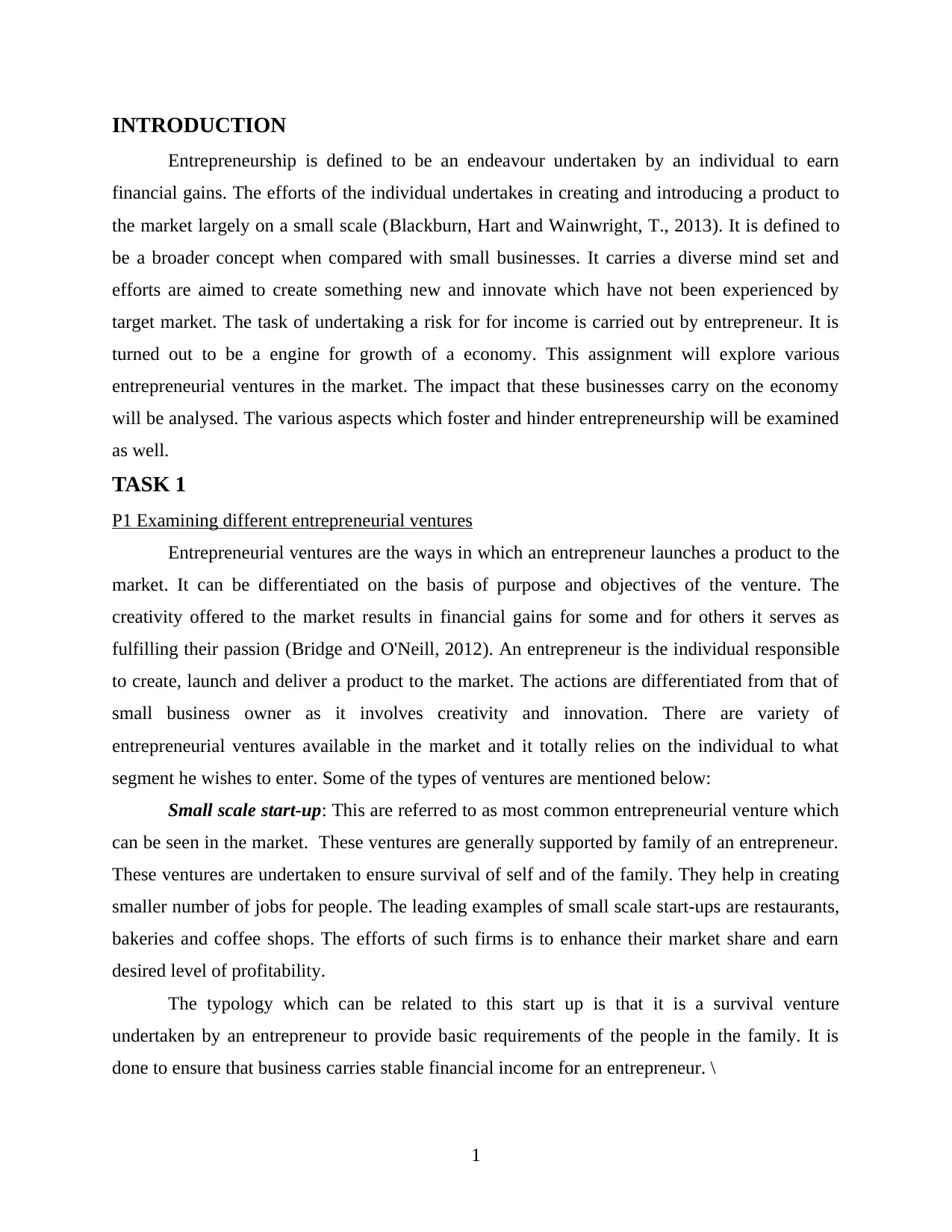
INTRODUCTION
Entrepreneurship is defined to be an endeavour undertaken by an individual to earn
financial gains. The efforts of the individual undertakes in creating and introducing a product to
the market largely on a small scale (Blackburn, Hart and Wainwright, T., 2013). It is defined to
be a broader concept when compared with small businesses. It carries a diverse mind set and
efforts are aimed to create something new and innovate which have not been experienced by
target market. The task of undertaking a risk for for income is carried out by entrepreneur. It is
turned out to be a engine for growth of a economy. This assignment will explore various
entrepreneurial ventures in the market. The impact that these businesses carry on the economy
will be analysed. The various aspects which foster and hinder entrepreneurship will be examined
as well.
TASK 1
P1 Examining different entrepreneurial ventures
Entrepreneurial ventures are the ways in which an entrepreneur launches a product to the
market. It can be differentiated on the basis of purpose and objectives of the venture. The
creativity offered to the market results in financial gains for some and for others it serves as
fulfilling their passion (Bridge and O'Neill, 2012). An entrepreneur is the individual responsible
to create, launch and deliver a product to the market. The actions are differentiated from that of
small business owner as it involves creativity and innovation. There are variety of
entrepreneurial ventures available in the market and it totally relies on the individual to what
segment he wishes to enter. Some of the types of ventures are mentioned below:
Small scale start-up: This are referred to as most common entrepreneurial venture which
can be seen in the market. These ventures are generally supported by family of an entrepreneur.
These ventures are undertaken to ensure survival of self and of the family. They help in creating
smaller number of jobs for people. The leading examples of small scale start-ups are restaurants,
bakeries and coffee shops. The efforts of such firms is to enhance their market share and earn
desired level of profitability.
The typology which can be related to this start up is that it is a survival venture
undertaken by an entrepreneur to provide basic requirements of the people in the family. It is
done to ensure that business carries stable financial income for an entrepreneur. \
1
Entrepreneurship is defined to be an endeavour undertaken by an individual to earn
financial gains. The efforts of the individual undertakes in creating and introducing a product to
the market largely on a small scale (Blackburn, Hart and Wainwright, T., 2013). It is defined to
be a broader concept when compared with small businesses. It carries a diverse mind set and
efforts are aimed to create something new and innovate which have not been experienced by
target market. The task of undertaking a risk for for income is carried out by entrepreneur. It is
turned out to be a engine for growth of a economy. This assignment will explore various
entrepreneurial ventures in the market. The impact that these businesses carry on the economy
will be analysed. The various aspects which foster and hinder entrepreneurship will be examined
as well.
TASK 1
P1 Examining different entrepreneurial ventures
Entrepreneurial ventures are the ways in which an entrepreneur launches a product to the
market. It can be differentiated on the basis of purpose and objectives of the venture. The
creativity offered to the market results in financial gains for some and for others it serves as
fulfilling their passion (Bridge and O'Neill, 2012). An entrepreneur is the individual responsible
to create, launch and deliver a product to the market. The actions are differentiated from that of
small business owner as it involves creativity and innovation. There are variety of
entrepreneurial ventures available in the market and it totally relies on the individual to what
segment he wishes to enter. Some of the types of ventures are mentioned below:
Small scale start-up: This are referred to as most common entrepreneurial venture which
can be seen in the market. These ventures are generally supported by family of an entrepreneur.
These ventures are undertaken to ensure survival of self and of the family. They help in creating
smaller number of jobs for people. The leading examples of small scale start-ups are restaurants,
bakeries and coffee shops. The efforts of such firms is to enhance their market share and earn
desired level of profitability.
The typology which can be related to this start up is that it is a survival venture
undertaken by an entrepreneur to provide basic requirements of the people in the family. It is
done to ensure that business carries stable financial income for an entrepreneur. \
1
⊘ This is a preview!⊘
Do you want full access?
Subscribe today to unlock all pages.

Trusted by 1+ million students worldwide
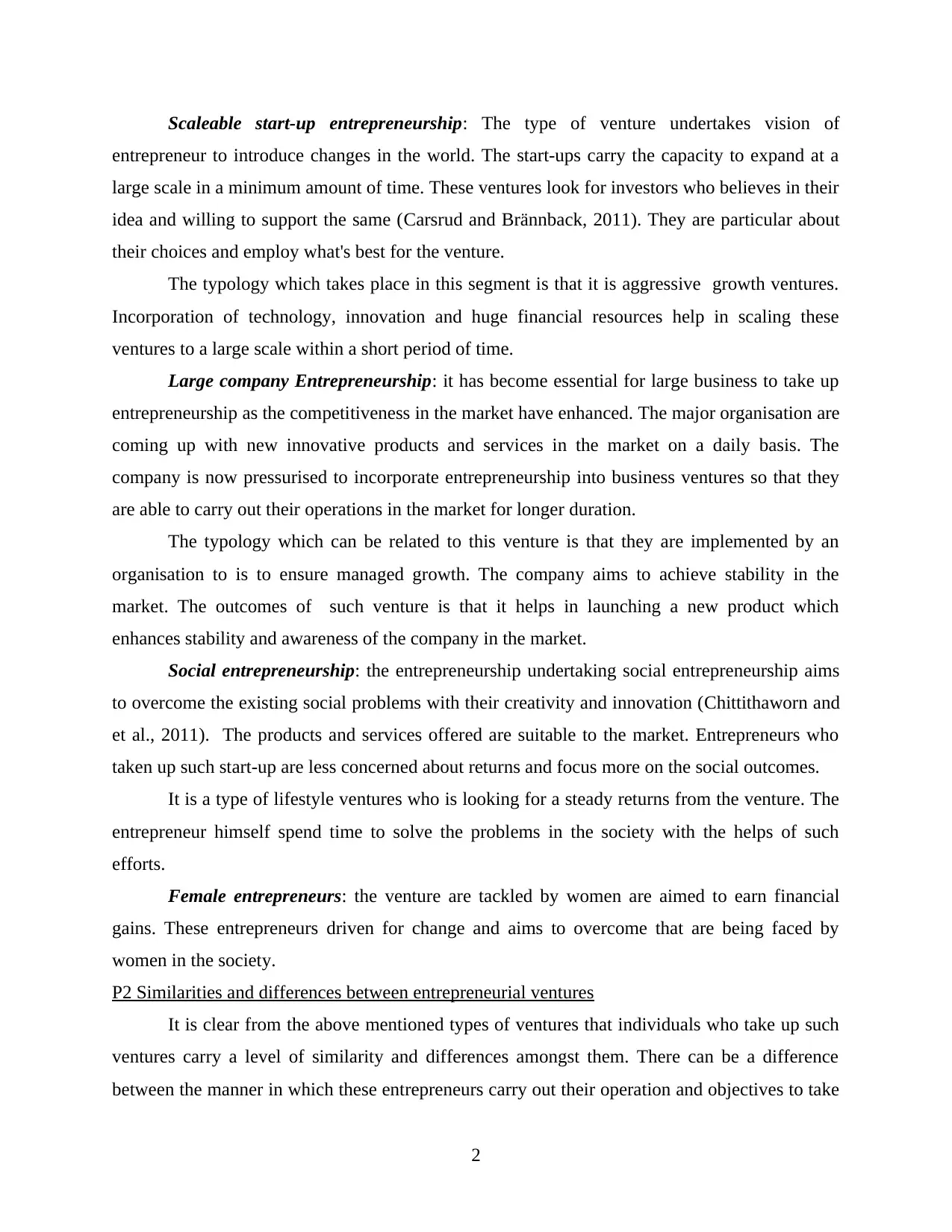
Scaleable start-up entrepreneurship: The type of venture undertakes vision of
entrepreneur to introduce changes in the world. The start-ups carry the capacity to expand at a
large scale in a minimum amount of time. These ventures look for investors who believes in their
idea and willing to support the same (Carsrud and Brännback, 2011). They are particular about
their choices and employ what's best for the venture.
The typology which takes place in this segment is that it is aggressive growth ventures.
Incorporation of technology, innovation and huge financial resources help in scaling these
ventures to a large scale within a short period of time.
Large company Entrepreneurship: it has become essential for large business to take up
entrepreneurship as the competitiveness in the market have enhanced. The major organisation are
coming up with new innovative products and services in the market on a daily basis. The
company is now pressurised to incorporate entrepreneurship into business ventures so that they
are able to carry out their operations in the market for longer duration.
The typology which can be related to this venture is that they are implemented by an
organisation to is to ensure managed growth. The company aims to achieve stability in the
market. The outcomes of such venture is that it helps in launching a new product which
enhances stability and awareness of the company in the market.
Social entrepreneurship: the entrepreneurship undertaking social entrepreneurship aims
to overcome the existing social problems with their creativity and innovation (Chittithaworn and
et al., 2011). The products and services offered are suitable to the market. Entrepreneurs who
taken up such start-up are less concerned about returns and focus more on the social outcomes.
It is a type of lifestyle ventures who is looking for a steady returns from the venture. The
entrepreneur himself spend time to solve the problems in the society with the helps of such
efforts.
Female entrepreneurs: the venture are tackled by women are aimed to earn financial
gains. These entrepreneurs driven for change and aims to overcome that are being faced by
women in the society.
P2 Similarities and differences between entrepreneurial ventures
It is clear from the above mentioned types of ventures that individuals who take up such
ventures carry a level of similarity and differences amongst them. There can be a difference
between the manner in which these entrepreneurs carry out their operation and objectives to take
2
entrepreneur to introduce changes in the world. The start-ups carry the capacity to expand at a
large scale in a minimum amount of time. These ventures look for investors who believes in their
idea and willing to support the same (Carsrud and Brännback, 2011). They are particular about
their choices and employ what's best for the venture.
The typology which takes place in this segment is that it is aggressive growth ventures.
Incorporation of technology, innovation and huge financial resources help in scaling these
ventures to a large scale within a short period of time.
Large company Entrepreneurship: it has become essential for large business to take up
entrepreneurship as the competitiveness in the market have enhanced. The major organisation are
coming up with new innovative products and services in the market on a daily basis. The
company is now pressurised to incorporate entrepreneurship into business ventures so that they
are able to carry out their operations in the market for longer duration.
The typology which can be related to this venture is that they are implemented by an
organisation to is to ensure managed growth. The company aims to achieve stability in the
market. The outcomes of such venture is that it helps in launching a new product which
enhances stability and awareness of the company in the market.
Social entrepreneurship: the entrepreneurship undertaking social entrepreneurship aims
to overcome the existing social problems with their creativity and innovation (Chittithaworn and
et al., 2011). The products and services offered are suitable to the market. Entrepreneurs who
taken up such start-up are less concerned about returns and focus more on the social outcomes.
It is a type of lifestyle ventures who is looking for a steady returns from the venture. The
entrepreneur himself spend time to solve the problems in the society with the helps of such
efforts.
Female entrepreneurs: the venture are tackled by women are aimed to earn financial
gains. These entrepreneurs driven for change and aims to overcome that are being faced by
women in the society.
P2 Similarities and differences between entrepreneurial ventures
It is clear from the above mentioned types of ventures that individuals who take up such
ventures carry a level of similarity and differences amongst them. There can be a difference
between the manner in which these entrepreneurs carry out their operation and objectives to take
2
Paraphrase This Document
Need a fresh take? Get an instant paraphrase of this document with our AI Paraphraser
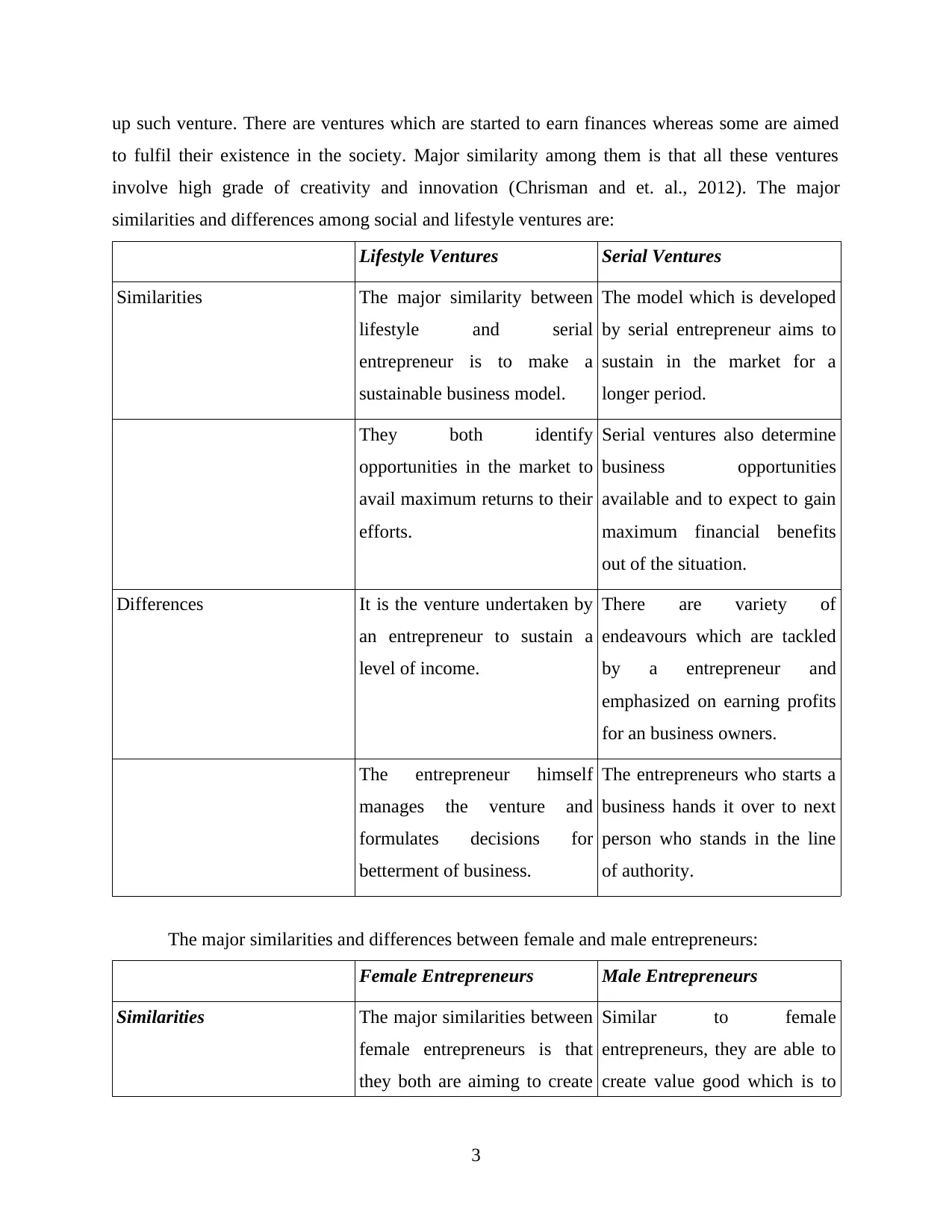
up such venture. There are ventures which are started to earn finances whereas some are aimed
to fulfil their existence in the society. Major similarity among them is that all these ventures
involve high grade of creativity and innovation (Chrisman and et. al., 2012). The major
similarities and differences among social and lifestyle ventures are:
Lifestyle Ventures Serial Ventures
Similarities The major similarity between
lifestyle and serial
entrepreneur is to make a
sustainable business model.
The model which is developed
by serial entrepreneur aims to
sustain in the market for a
longer period.
They both identify
opportunities in the market to
avail maximum returns to their
efforts.
Serial ventures also determine
business opportunities
available and to expect to gain
maximum financial benefits
out of the situation.
Differences It is the venture undertaken by
an entrepreneur to sustain a
level of income.
There are variety of
endeavours which are tackled
by a entrepreneur and
emphasized on earning profits
for an business owners.
The entrepreneur himself
manages the venture and
formulates decisions for
betterment of business.
The entrepreneurs who starts a
business hands it over to next
person who stands in the line
of authority.
The major similarities and differences between female and male entrepreneurs:
Female Entrepreneurs Male Entrepreneurs
Similarities The major similarities between
female entrepreneurs is that
they both are aiming to create
Similar to female
entrepreneurs, they are able to
create value good which is to
3
to fulfil their existence in the society. Major similarity among them is that all these ventures
involve high grade of creativity and innovation (Chrisman and et. al., 2012). The major
similarities and differences among social and lifestyle ventures are:
Lifestyle Ventures Serial Ventures
Similarities The major similarity between
lifestyle and serial
entrepreneur is to make a
sustainable business model.
The model which is developed
by serial entrepreneur aims to
sustain in the market for a
longer period.
They both identify
opportunities in the market to
avail maximum returns to their
efforts.
Serial ventures also determine
business opportunities
available and to expect to gain
maximum financial benefits
out of the situation.
Differences It is the venture undertaken by
an entrepreneur to sustain a
level of income.
There are variety of
endeavours which are tackled
by a entrepreneur and
emphasized on earning profits
for an business owners.
The entrepreneur himself
manages the venture and
formulates decisions for
betterment of business.
The entrepreneurs who starts a
business hands it over to next
person who stands in the line
of authority.
The major similarities and differences between female and male entrepreneurs:
Female Entrepreneurs Male Entrepreneurs
Similarities The major similarities between
female entrepreneurs is that
they both are aiming to create
Similar to female
entrepreneurs, they are able to
create value good which is to
3
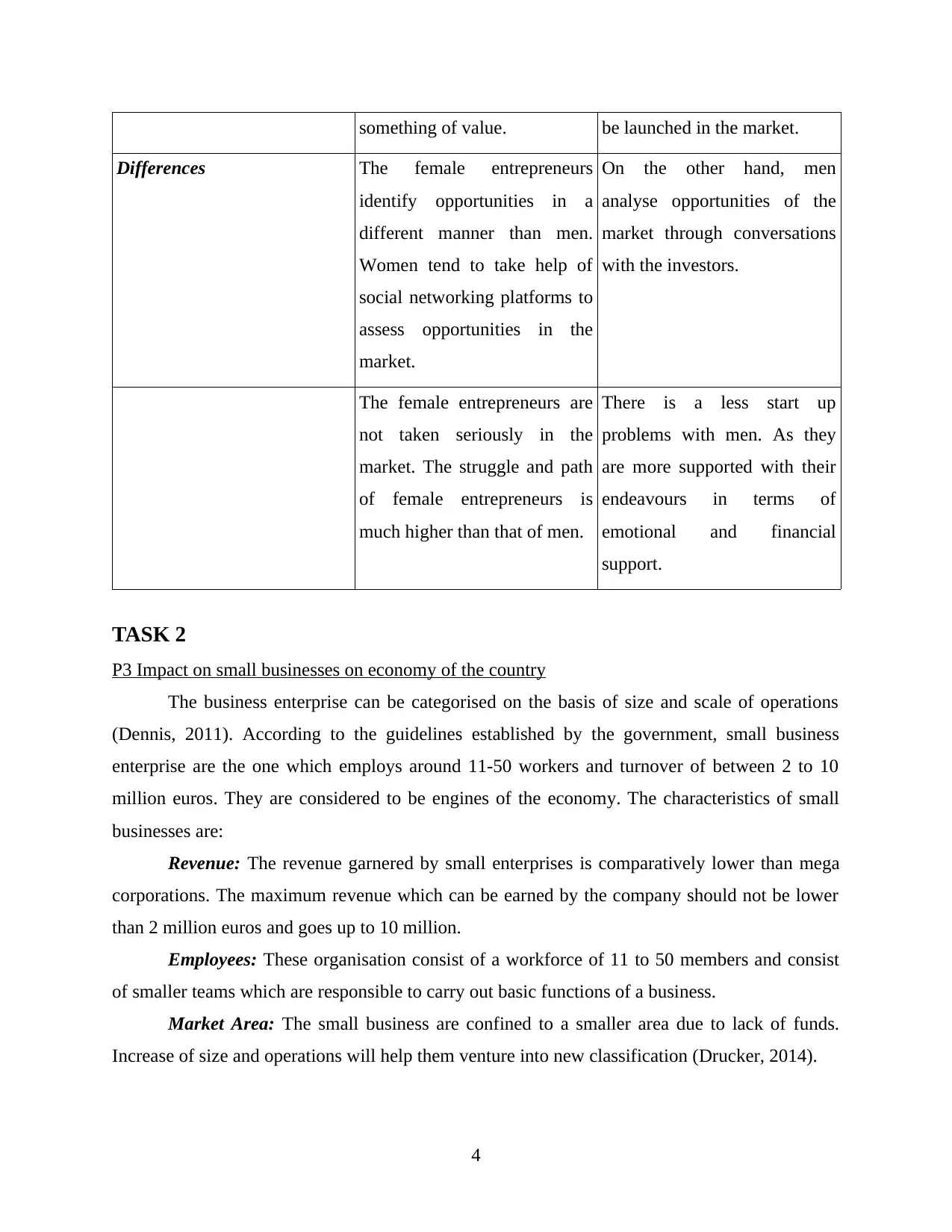
something of value. be launched in the market.
Differences The female entrepreneurs
identify opportunities in a
different manner than men.
Women tend to take help of
social networking platforms to
assess opportunities in the
market.
On the other hand, men
analyse opportunities of the
market through conversations
with the investors.
The female entrepreneurs are
not taken seriously in the
market. The struggle and path
of female entrepreneurs is
much higher than that of men.
There is a less start up
problems with men. As they
are more supported with their
endeavours in terms of
emotional and financial
support.
TASK 2
P3 Impact on small businesses on economy of the country
The business enterprise can be categorised on the basis of size and scale of operations
(Dennis, 2011). According to the guidelines established by the government, small business
enterprise are the one which employs around 11-50 workers and turnover of between 2 to 10
million euros. They are considered to be engines of the economy. The characteristics of small
businesses are:
Revenue: The revenue garnered by small enterprises is comparatively lower than mega
corporations. The maximum revenue which can be earned by the company should not be lower
than 2 million euros and goes up to 10 million.
Employees: These organisation consist of a workforce of 11 to 50 members and consist
of smaller teams which are responsible to carry out basic functions of a business.
Market Area: The small business are confined to a smaller area due to lack of funds.
Increase of size and operations will help them venture into new classification (Drucker, 2014).
4
Differences The female entrepreneurs
identify opportunities in a
different manner than men.
Women tend to take help of
social networking platforms to
assess opportunities in the
market.
On the other hand, men
analyse opportunities of the
market through conversations
with the investors.
The female entrepreneurs are
not taken seriously in the
market. The struggle and path
of female entrepreneurs is
much higher than that of men.
There is a less start up
problems with men. As they
are more supported with their
endeavours in terms of
emotional and financial
support.
TASK 2
P3 Impact on small businesses on economy of the country
The business enterprise can be categorised on the basis of size and scale of operations
(Dennis, 2011). According to the guidelines established by the government, small business
enterprise are the one which employs around 11-50 workers and turnover of between 2 to 10
million euros. They are considered to be engines of the economy. The characteristics of small
businesses are:
Revenue: The revenue garnered by small enterprises is comparatively lower than mega
corporations. The maximum revenue which can be earned by the company should not be lower
than 2 million euros and goes up to 10 million.
Employees: These organisation consist of a workforce of 11 to 50 members and consist
of smaller teams which are responsible to carry out basic functions of a business.
Market Area: The small business are confined to a smaller area due to lack of funds.
Increase of size and operations will help them venture into new classification (Drucker, 2014).
4
⊘ This is a preview!⊘
Do you want full access?
Subscribe today to unlock all pages.

Trusted by 1+ million students worldwide
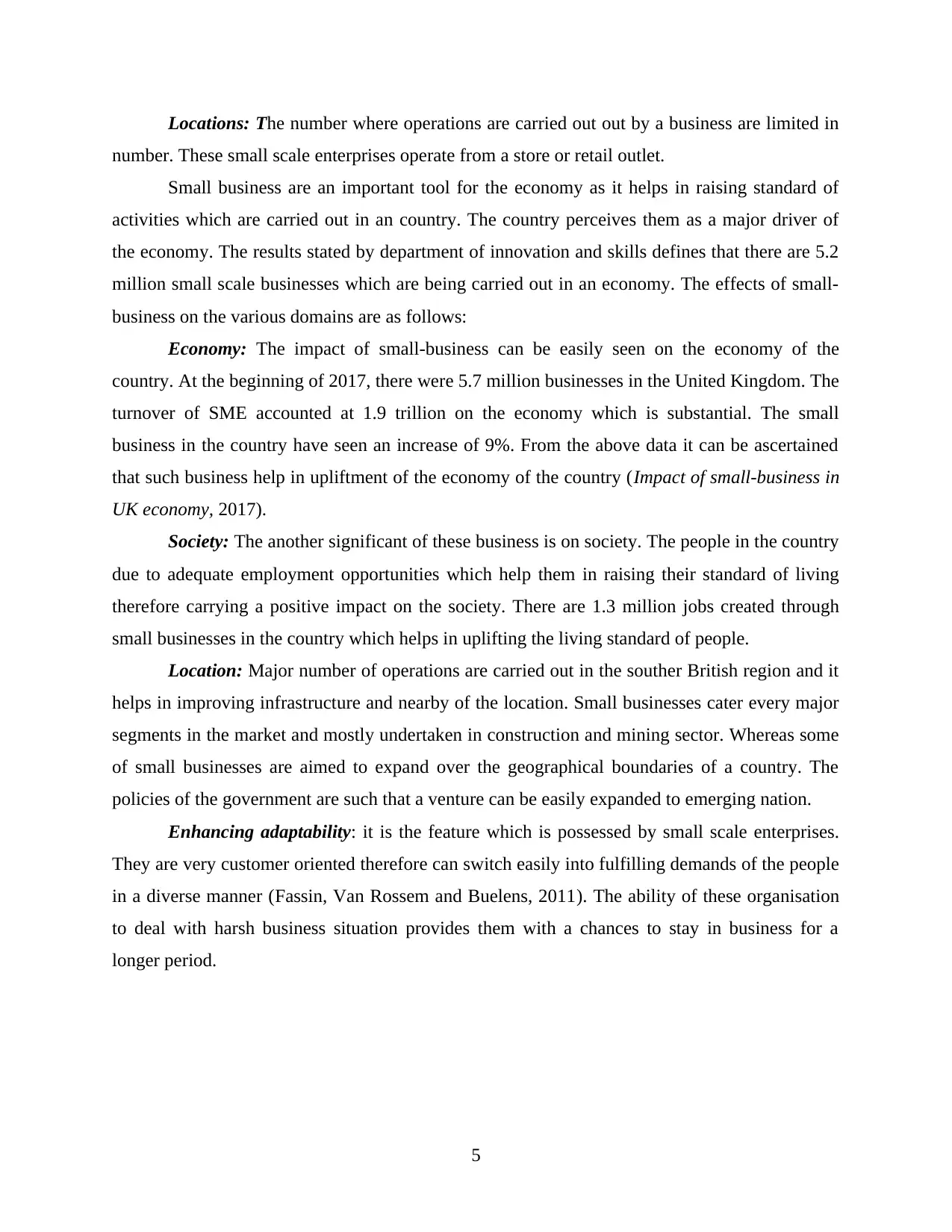
Locations: The number where operations are carried out out by a business are limited in
number. These small scale enterprises operate from a store or retail outlet.
Small business are an important tool for the economy as it helps in raising standard of
activities which are carried out in an country. The country perceives them as a major driver of
the economy. The results stated by department of innovation and skills defines that there are 5.2
million small scale businesses which are being carried out in an economy. The effects of small-
business on the various domains are as follows:
Economy: The impact of small-business can be easily seen on the economy of the
country. At the beginning of 2017, there were 5.7 million businesses in the United Kingdom. The
turnover of SME accounted at 1.9 trillion on the economy which is substantial. The small
business in the country have seen an increase of 9%. From the above data it can be ascertained
that such business help in upliftment of the economy of the country (Impact of small-business in
UK economy, 2017).
Society: The another significant of these business is on society. The people in the country
due to adequate employment opportunities which help them in raising their standard of living
therefore carrying a positive impact on the society. There are 1.3 million jobs created through
small businesses in the country which helps in uplifting the living standard of people.
Location: Major number of operations are carried out in the souther British region and it
helps in improving infrastructure and nearby of the location. Small businesses cater every major
segments in the market and mostly undertaken in construction and mining sector. Whereas some
of small businesses are aimed to expand over the geographical boundaries of a country. The
policies of the government are such that a venture can be easily expanded to emerging nation.
Enhancing adaptability: it is the feature which is possessed by small scale enterprises.
They are very customer oriented therefore can switch easily into fulfilling demands of the people
in a diverse manner (Fassin, Van Rossem and Buelens, 2011). The ability of these organisation
to deal with harsh business situation provides them with a chances to stay in business for a
longer period.
5
number. These small scale enterprises operate from a store or retail outlet.
Small business are an important tool for the economy as it helps in raising standard of
activities which are carried out in an country. The country perceives them as a major driver of
the economy. The results stated by department of innovation and skills defines that there are 5.2
million small scale businesses which are being carried out in an economy. The effects of small-
business on the various domains are as follows:
Economy: The impact of small-business can be easily seen on the economy of the
country. At the beginning of 2017, there were 5.7 million businesses in the United Kingdom. The
turnover of SME accounted at 1.9 trillion on the economy which is substantial. The small
business in the country have seen an increase of 9%. From the above data it can be ascertained
that such business help in upliftment of the economy of the country (Impact of small-business in
UK economy, 2017).
Society: The another significant of these business is on society. The people in the country
due to adequate employment opportunities which help them in raising their standard of living
therefore carrying a positive impact on the society. There are 1.3 million jobs created through
small businesses in the country which helps in uplifting the living standard of people.
Location: Major number of operations are carried out in the souther British region and it
helps in improving infrastructure and nearby of the location. Small businesses cater every major
segments in the market and mostly undertaken in construction and mining sector. Whereas some
of small businesses are aimed to expand over the geographical boundaries of a country. The
policies of the government are such that a venture can be easily expanded to emerging nation.
Enhancing adaptability: it is the feature which is possessed by small scale enterprises.
They are very customer oriented therefore can switch easily into fulfilling demands of the people
in a diverse manner (Fassin, Van Rossem and Buelens, 2011). The ability of these organisation
to deal with harsh business situation provides them with a chances to stay in business for a
longer period.
5
Paraphrase This Document
Need a fresh take? Get an instant paraphrase of this document with our AI Paraphraser
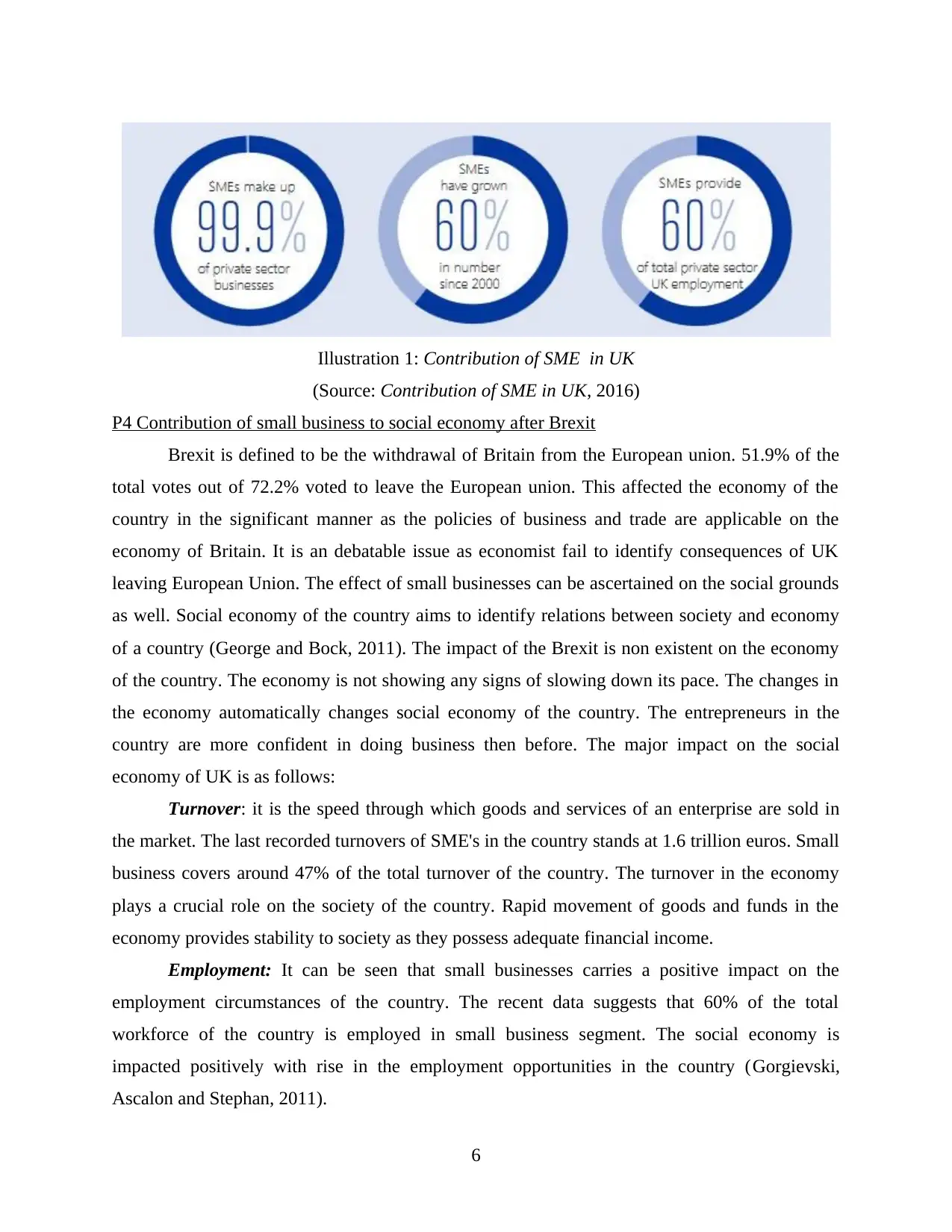
(Source: Contribution of SME in UK, 2016)
P4 Contribution of small business to social economy after Brexit
Brexit is defined to be the withdrawal of Britain from the European union. 51.9% of the
total votes out of 72.2% voted to leave the European union. This affected the economy of the
country in the significant manner as the policies of business and trade are applicable on the
economy of Britain. It is an debatable issue as economist fail to identify consequences of UK
leaving European Union. The effect of small businesses can be ascertained on the social grounds
as well. Social economy of the country aims to identify relations between society and economy
of a country (George and Bock, 2011). The impact of the Brexit is non existent on the economy
of the country. The economy is not showing any signs of slowing down its pace. The changes in
the economy automatically changes social economy of the country. The entrepreneurs in the
country are more confident in doing business then before. The major impact on the social
economy of UK is as follows:
Turnover: it is the speed through which goods and services of an enterprise are sold in
the market. The last recorded turnovers of SME's in the country stands at 1.6 trillion euros. Small
business covers around 47% of the total turnover of the country. The turnover in the economy
plays a crucial role on the society of the country. Rapid movement of goods and funds in the
economy provides stability to society as they possess adequate financial income.
Employment: It can be seen that small businesses carries a positive impact on the
employment circumstances of the country. The recent data suggests that 60% of the total
workforce of the country is employed in small business segment. The social economy is
impacted positively with rise in the employment opportunities in the country (Gorgievski,
Ascalon and Stephan, 2011).
6
Illustration 1: Contribution of SME in UK
P4 Contribution of small business to social economy after Brexit
Brexit is defined to be the withdrawal of Britain from the European union. 51.9% of the
total votes out of 72.2% voted to leave the European union. This affected the economy of the
country in the significant manner as the policies of business and trade are applicable on the
economy of Britain. It is an debatable issue as economist fail to identify consequences of UK
leaving European Union. The effect of small businesses can be ascertained on the social grounds
as well. Social economy of the country aims to identify relations between society and economy
of a country (George and Bock, 2011). The impact of the Brexit is non existent on the economy
of the country. The economy is not showing any signs of slowing down its pace. The changes in
the economy automatically changes social economy of the country. The entrepreneurs in the
country are more confident in doing business then before. The major impact on the social
economy of UK is as follows:
Turnover: it is the speed through which goods and services of an enterprise are sold in
the market. The last recorded turnovers of SME's in the country stands at 1.6 trillion euros. Small
business covers around 47% of the total turnover of the country. The turnover in the economy
plays a crucial role on the society of the country. Rapid movement of goods and funds in the
economy provides stability to society as they possess adequate financial income.
Employment: It can be seen that small businesses carries a positive impact on the
employment circumstances of the country. The recent data suggests that 60% of the total
workforce of the country is employed in small business segment. The social economy is
impacted positively with rise in the employment opportunities in the country (Gorgievski,
Ascalon and Stephan, 2011).
6
Illustration 1: Contribution of SME in UK
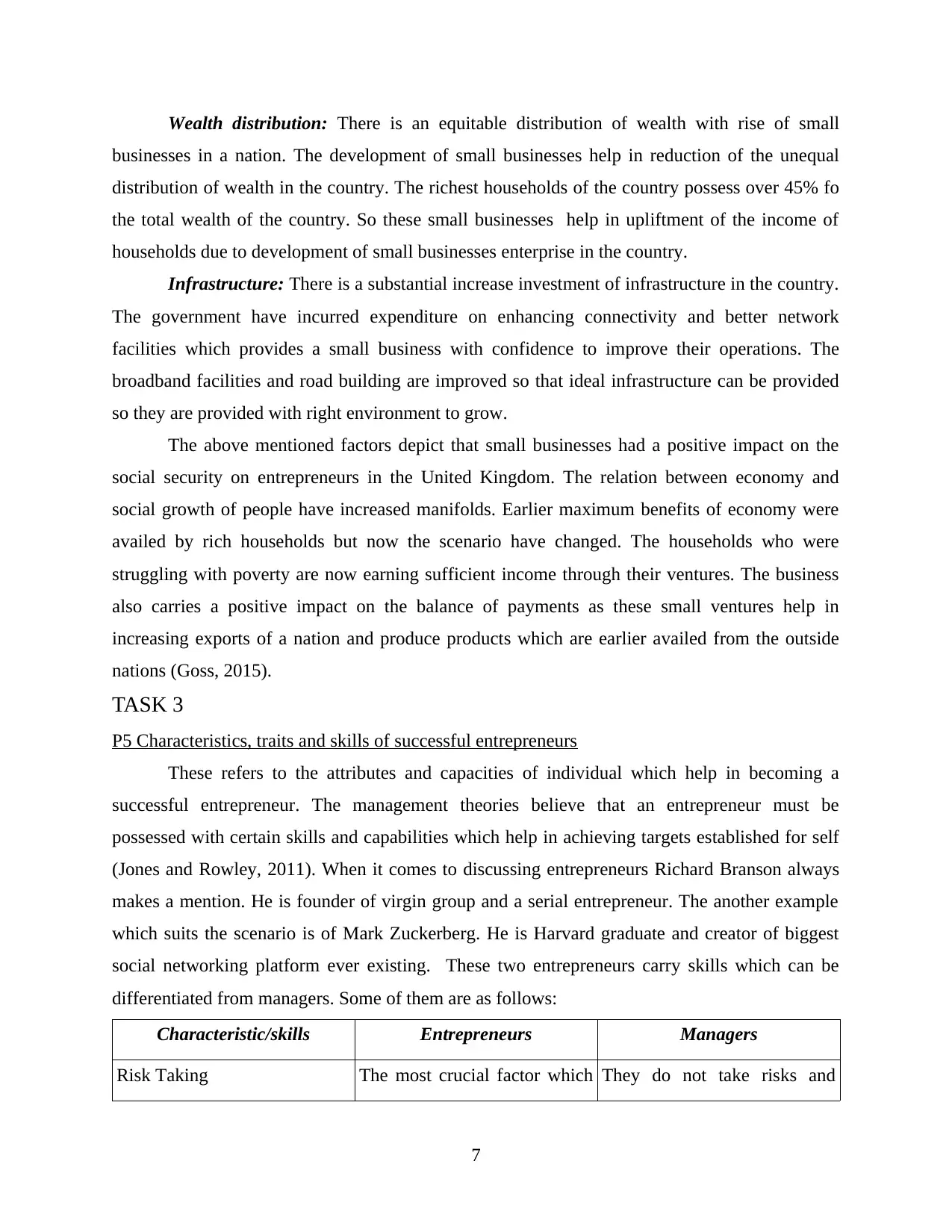
Wealth distribution: There is an equitable distribution of wealth with rise of small
businesses in a nation. The development of small businesses help in reduction of the unequal
distribution of wealth in the country. The richest households of the country possess over 45% fo
the total wealth of the country. So these small businesses help in upliftment of the income of
households due to development of small businesses enterprise in the country.
Infrastructure: There is a substantial increase investment of infrastructure in the country.
The government have incurred expenditure on enhancing connectivity and better network
facilities which provides a small business with confidence to improve their operations. The
broadband facilities and road building are improved so that ideal infrastructure can be provided
so they are provided with right environment to grow.
The above mentioned factors depict that small businesses had a positive impact on the
social security on entrepreneurs in the United Kingdom. The relation between economy and
social growth of people have increased manifolds. Earlier maximum benefits of economy were
availed by rich households but now the scenario have changed. The households who were
struggling with poverty are now earning sufficient income through their ventures. The business
also carries a positive impact on the balance of payments as these small ventures help in
increasing exports of a nation and produce products which are earlier availed from the outside
nations (Goss, 2015).
TASK 3
P5 Characteristics, traits and skills of successful entrepreneurs
These refers to the attributes and capacities of individual which help in becoming a
successful entrepreneur. The management theories believe that an entrepreneur must be
possessed with certain skills and capabilities which help in achieving targets established for self
(Jones and Rowley, 2011). When it comes to discussing entrepreneurs Richard Branson always
makes a mention. He is founder of virgin group and a serial entrepreneur. The another example
which suits the scenario is of Mark Zuckerberg. He is Harvard graduate and creator of biggest
social networking platform ever existing. These two entrepreneurs carry skills which can be
differentiated from managers. Some of them are as follows:
Characteristic/skills Entrepreneurs Managers
Risk Taking The most crucial factor which They do not take risks and
7
businesses in a nation. The development of small businesses help in reduction of the unequal
distribution of wealth in the country. The richest households of the country possess over 45% fo
the total wealth of the country. So these small businesses help in upliftment of the income of
households due to development of small businesses enterprise in the country.
Infrastructure: There is a substantial increase investment of infrastructure in the country.
The government have incurred expenditure on enhancing connectivity and better network
facilities which provides a small business with confidence to improve their operations. The
broadband facilities and road building are improved so that ideal infrastructure can be provided
so they are provided with right environment to grow.
The above mentioned factors depict that small businesses had a positive impact on the
social security on entrepreneurs in the United Kingdom. The relation between economy and
social growth of people have increased manifolds. Earlier maximum benefits of economy were
availed by rich households but now the scenario have changed. The households who were
struggling with poverty are now earning sufficient income through their ventures. The business
also carries a positive impact on the balance of payments as these small ventures help in
increasing exports of a nation and produce products which are earlier availed from the outside
nations (Goss, 2015).
TASK 3
P5 Characteristics, traits and skills of successful entrepreneurs
These refers to the attributes and capacities of individual which help in becoming a
successful entrepreneur. The management theories believe that an entrepreneur must be
possessed with certain skills and capabilities which help in achieving targets established for self
(Jones and Rowley, 2011). When it comes to discussing entrepreneurs Richard Branson always
makes a mention. He is founder of virgin group and a serial entrepreneur. The another example
which suits the scenario is of Mark Zuckerberg. He is Harvard graduate and creator of biggest
social networking platform ever existing. These two entrepreneurs carry skills which can be
differentiated from managers. Some of them are as follows:
Characteristic/skills Entrepreneurs Managers
Risk Taking The most crucial factor which They do not take risks and
7
⊘ This is a preview!⊘
Do you want full access?
Subscribe today to unlock all pages.

Trusted by 1+ million students worldwide
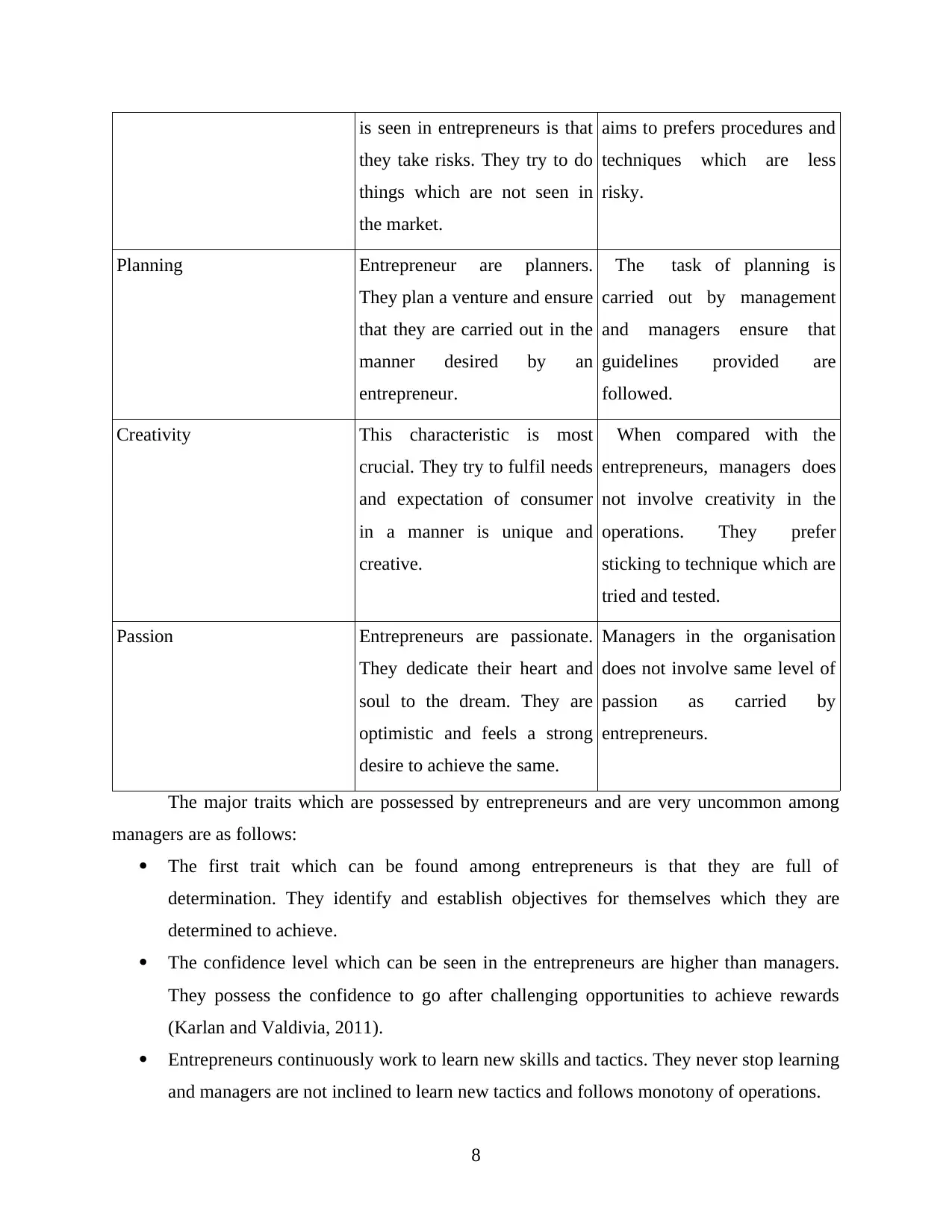
is seen in entrepreneurs is that
they take risks. They try to do
things which are not seen in
the market.
aims to prefers procedures and
techniques which are less
risky.
Planning Entrepreneur are planners.
They plan a venture and ensure
that they are carried out in the
manner desired by an
entrepreneur.
The task of planning is
carried out by management
and managers ensure that
guidelines provided are
followed.
Creativity This characteristic is most
crucial. They try to fulfil needs
and expectation of consumer
in a manner is unique and
creative.
When compared with the
entrepreneurs, managers does
not involve creativity in the
operations. They prefer
sticking to technique which are
tried and tested.
Passion Entrepreneurs are passionate.
They dedicate their heart and
soul to the dream. They are
optimistic and feels a strong
desire to achieve the same.
Managers in the organisation
does not involve same level of
passion as carried by
entrepreneurs.
The major traits which are possessed by entrepreneurs and are very uncommon among
managers are as follows:
The first trait which can be found among entrepreneurs is that they are full of
determination. They identify and establish objectives for themselves which they are
determined to achieve.
The confidence level which can be seen in the entrepreneurs are higher than managers.
They possess the confidence to go after challenging opportunities to achieve rewards
(Karlan and Valdivia, 2011).
Entrepreneurs continuously work to learn new skills and tactics. They never stop learning
and managers are not inclined to learn new tactics and follows monotony of operations.
8
they take risks. They try to do
things which are not seen in
the market.
aims to prefers procedures and
techniques which are less
risky.
Planning Entrepreneur are planners.
They plan a venture and ensure
that they are carried out in the
manner desired by an
entrepreneur.
The task of planning is
carried out by management
and managers ensure that
guidelines provided are
followed.
Creativity This characteristic is most
crucial. They try to fulfil needs
and expectation of consumer
in a manner is unique and
creative.
When compared with the
entrepreneurs, managers does
not involve creativity in the
operations. They prefer
sticking to technique which are
tried and tested.
Passion Entrepreneurs are passionate.
They dedicate their heart and
soul to the dream. They are
optimistic and feels a strong
desire to achieve the same.
Managers in the organisation
does not involve same level of
passion as carried by
entrepreneurs.
The major traits which are possessed by entrepreneurs and are very uncommon among
managers are as follows:
The first trait which can be found among entrepreneurs is that they are full of
determination. They identify and establish objectives for themselves which they are
determined to achieve.
The confidence level which can be seen in the entrepreneurs are higher than managers.
They possess the confidence to go after challenging opportunities to achieve rewards
(Karlan and Valdivia, 2011).
Entrepreneurs continuously work to learn new skills and tactics. They never stop learning
and managers are not inclined to learn new tactics and follows monotony of operations.
8
Paraphrase This Document
Need a fresh take? Get an instant paraphrase of this document with our AI Paraphraser
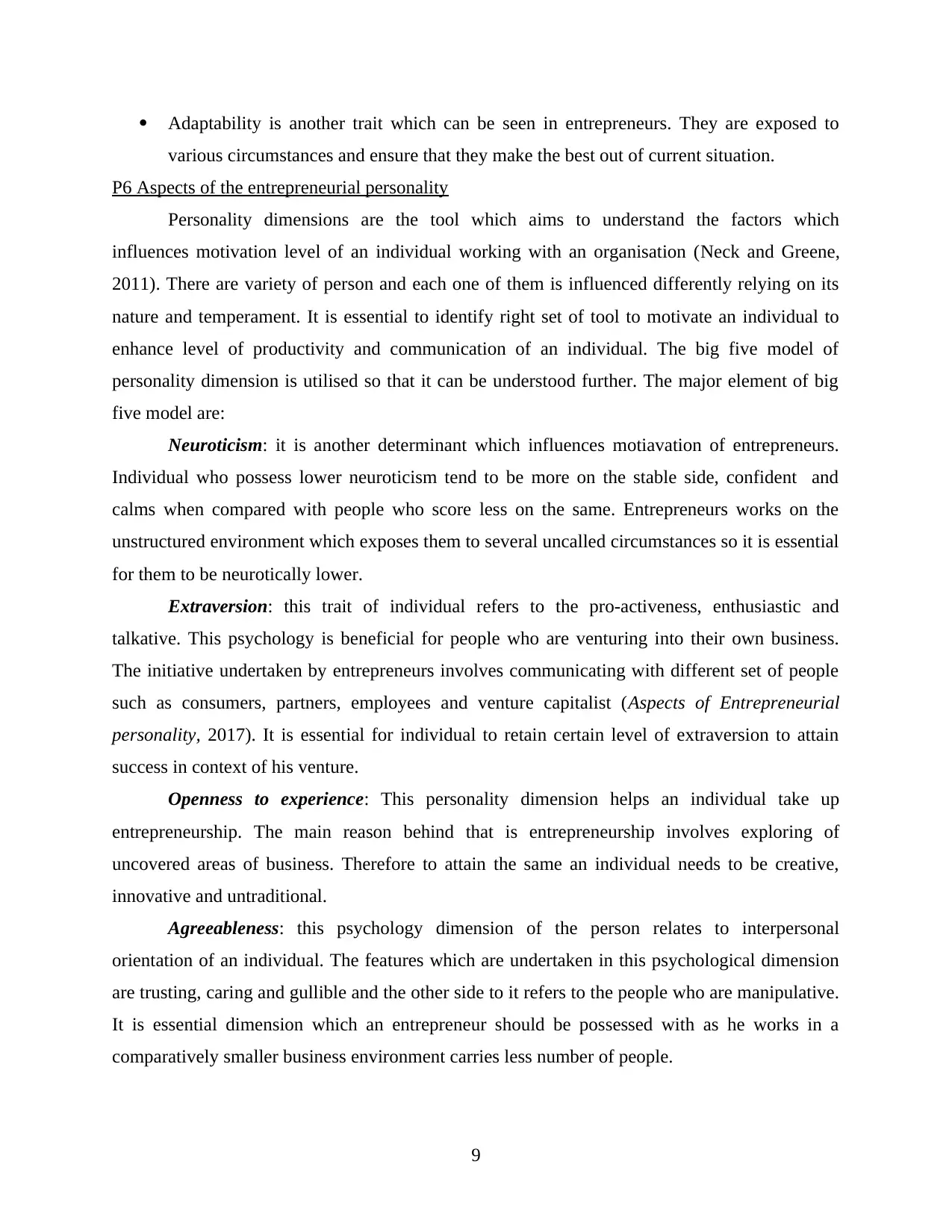
Adaptability is another trait which can be seen in entrepreneurs. They are exposed to
various circumstances and ensure that they make the best out of current situation.
P6 Aspects of the entrepreneurial personality
Personality dimensions are the tool which aims to understand the factors which
influences motivation level of an individual working with an organisation (Neck and Greene,
2011). There are variety of person and each one of them is influenced differently relying on its
nature and temperament. It is essential to identify right set of tool to motivate an individual to
enhance level of productivity and communication of an individual. The big five model of
personality dimension is utilised so that it can be understood further. The major element of big
five model are:
Neuroticism: it is another determinant which influences motiavation of entrepreneurs.
Individual who possess lower neuroticism tend to be more on the stable side, confident and
calms when compared with people who score less on the same. Entrepreneurs works on the
unstructured environment which exposes them to several uncalled circumstances so it is essential
for them to be neurotically lower.
Extraversion: this trait of individual refers to the pro-activeness, enthusiastic and
talkative. This psychology is beneficial for people who are venturing into their own business.
The initiative undertaken by entrepreneurs involves communicating with different set of people
such as consumers, partners, employees and venture capitalist (Aspects of Entrepreneurial
personality, 2017). It is essential for individual to retain certain level of extraversion to attain
success in context of his venture.
Openness to experience: This personality dimension helps an individual take up
entrepreneurship. The main reason behind that is entrepreneurship involves exploring of
uncovered areas of business. Therefore to attain the same an individual needs to be creative,
innovative and untraditional.
Agreeableness: this psychology dimension of the person relates to interpersonal
orientation of an individual. The features which are undertaken in this psychological dimension
are trusting, caring and gullible and the other side to it refers to the people who are manipulative.
It is essential dimension which an entrepreneur should be possessed with as he works in a
comparatively smaller business environment carries less number of people.
9
various circumstances and ensure that they make the best out of current situation.
P6 Aspects of the entrepreneurial personality
Personality dimensions are the tool which aims to understand the factors which
influences motivation level of an individual working with an organisation (Neck and Greene,
2011). There are variety of person and each one of them is influenced differently relying on its
nature and temperament. It is essential to identify right set of tool to motivate an individual to
enhance level of productivity and communication of an individual. The big five model of
personality dimension is utilised so that it can be understood further. The major element of big
five model are:
Neuroticism: it is another determinant which influences motiavation of entrepreneurs.
Individual who possess lower neuroticism tend to be more on the stable side, confident and
calms when compared with people who score less on the same. Entrepreneurs works on the
unstructured environment which exposes them to several uncalled circumstances so it is essential
for them to be neurotically lower.
Extraversion: this trait of individual refers to the pro-activeness, enthusiastic and
talkative. This psychology is beneficial for people who are venturing into their own business.
The initiative undertaken by entrepreneurs involves communicating with different set of people
such as consumers, partners, employees and venture capitalist (Aspects of Entrepreneurial
personality, 2017). It is essential for individual to retain certain level of extraversion to attain
success in context of his venture.
Openness to experience: This personality dimension helps an individual take up
entrepreneurship. The main reason behind that is entrepreneurship involves exploring of
uncovered areas of business. Therefore to attain the same an individual needs to be creative,
innovative and untraditional.
Agreeableness: this psychology dimension of the person relates to interpersonal
orientation of an individual. The features which are undertaken in this psychological dimension
are trusting, caring and gullible and the other side to it refers to the people who are manipulative.
It is essential dimension which an entrepreneur should be possessed with as he works in a
comparatively smaller business environment carries less number of people.
9
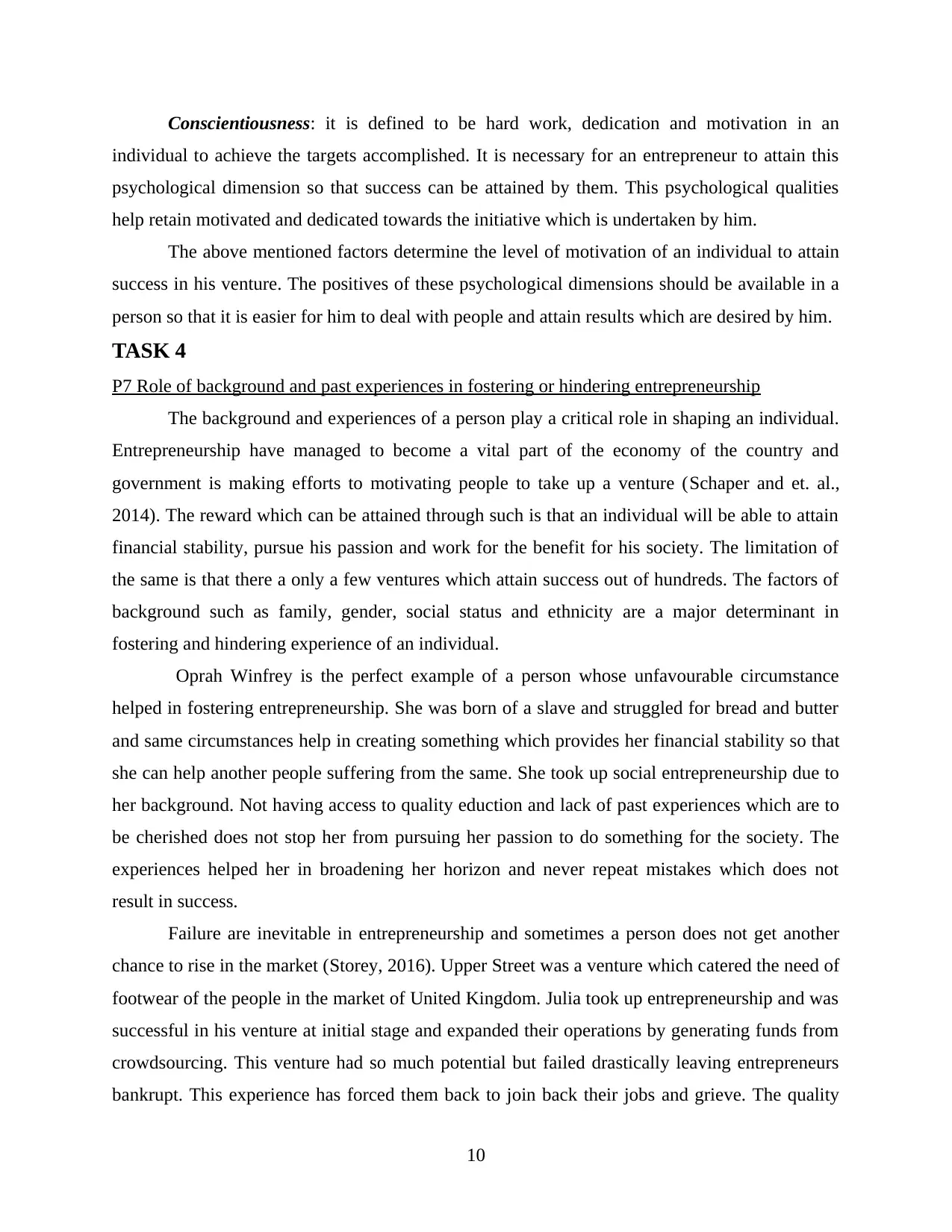
Conscientiousness: it is defined to be hard work, dedication and motivation in an
individual to achieve the targets accomplished. It is necessary for an entrepreneur to attain this
psychological dimension so that success can be attained by them. This psychological qualities
help retain motivated and dedicated towards the initiative which is undertaken by him.
The above mentioned factors determine the level of motivation of an individual to attain
success in his venture. The positives of these psychological dimensions should be available in a
person so that it is easier for him to deal with people and attain results which are desired by him.
TASK 4
P7 Role of background and past experiences in fostering or hindering entrepreneurship
The background and experiences of a person play a critical role in shaping an individual.
Entrepreneurship have managed to become a vital part of the economy of the country and
government is making efforts to motivating people to take up a venture (Schaper and et. al.,
2014). The reward which can be attained through such is that an individual will be able to attain
financial stability, pursue his passion and work for the benefit for his society. The limitation of
the same is that there a only a few ventures which attain success out of hundreds. The factors of
background such as family, gender, social status and ethnicity are a major determinant in
fostering and hindering experience of an individual.
Oprah Winfrey is the perfect example of a person whose unfavourable circumstance
helped in fostering entrepreneurship. She was born of a slave and struggled for bread and butter
and same circumstances help in creating something which provides her financial stability so that
she can help another people suffering from the same. She took up social entrepreneurship due to
her background. Not having access to quality eduction and lack of past experiences which are to
be cherished does not stop her from pursuing her passion to do something for the society. The
experiences helped her in broadening her horizon and never repeat mistakes which does not
result in success.
Failure are inevitable in entrepreneurship and sometimes a person does not get another
chance to rise in the market (Storey, 2016). Upper Street was a venture which catered the need of
footwear of the people in the market of United Kingdom. Julia took up entrepreneurship and was
successful in his venture at initial stage and expanded their operations by generating funds from
crowdsourcing. This venture had so much potential but failed drastically leaving entrepreneurs
bankrupt. This experience has forced them back to join back their jobs and grieve. The quality
10
individual to achieve the targets accomplished. It is necessary for an entrepreneur to attain this
psychological dimension so that success can be attained by them. This psychological qualities
help retain motivated and dedicated towards the initiative which is undertaken by him.
The above mentioned factors determine the level of motivation of an individual to attain
success in his venture. The positives of these psychological dimensions should be available in a
person so that it is easier for him to deal with people and attain results which are desired by him.
TASK 4
P7 Role of background and past experiences in fostering or hindering entrepreneurship
The background and experiences of a person play a critical role in shaping an individual.
Entrepreneurship have managed to become a vital part of the economy of the country and
government is making efforts to motivating people to take up a venture (Schaper and et. al.,
2014). The reward which can be attained through such is that an individual will be able to attain
financial stability, pursue his passion and work for the benefit for his society. The limitation of
the same is that there a only a few ventures which attain success out of hundreds. The factors of
background such as family, gender, social status and ethnicity are a major determinant in
fostering and hindering experience of an individual.
Oprah Winfrey is the perfect example of a person whose unfavourable circumstance
helped in fostering entrepreneurship. She was born of a slave and struggled for bread and butter
and same circumstances help in creating something which provides her financial stability so that
she can help another people suffering from the same. She took up social entrepreneurship due to
her background. Not having access to quality eduction and lack of past experiences which are to
be cherished does not stop her from pursuing her passion to do something for the society. The
experiences helped her in broadening her horizon and never repeat mistakes which does not
result in success.
Failure are inevitable in entrepreneurship and sometimes a person does not get another
chance to rise in the market (Storey, 2016). Upper Street was a venture which catered the need of
footwear of the people in the market of United Kingdom. Julia took up entrepreneurship and was
successful in his venture at initial stage and expanded their operations by generating funds from
crowdsourcing. This venture had so much potential but failed drastically leaving entrepreneurs
bankrupt. This experience has forced them back to join back their jobs and grieve. The quality
10
⊘ This is a preview!⊘
Do you want full access?
Subscribe today to unlock all pages.

Trusted by 1+ million students worldwide
1 out of 15
Related Documents
Your All-in-One AI-Powered Toolkit for Academic Success.
+13062052269
info@desklib.com
Available 24*7 on WhatsApp / Email
![[object Object]](/_next/static/media/star-bottom.7253800d.svg)
Unlock your academic potential
Copyright © 2020–2026 A2Z Services. All Rights Reserved. Developed and managed by ZUCOL.





